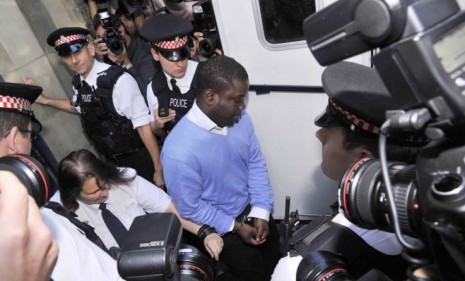A rogue UBS trader's $2 billion loss: 4 lessons
Three years after the Lehman Brothers collapse, a single trader racks up massive unauthorized losses at UBS

A free daily email with the biggest news stories of the day – and the best features from TheWeek.com
You are now subscribed
Your newsletter sign-up was successful
On Thursday, three years to the day after Lehman Brothers collapsed, UBS' investment banking operation in London announced an unauthorized loss of $2 billion. The banking giant pinned the whopping, unexpected loss on a single rogue trader, 31-year-old Kweku Adoboli, who was arrested Thursday morning and charged with one count of fraud and two counts of false accounting. The scandal has sent tremors through Wall Street, raising questions about how this could have happened after regulatory controls were tightened in the wake of the 2008 banking crisis. Here, four lessons from this new scandal:
1. Traders can't be trusted
Unbelievable, says David Buik at CNN. Maybe these traders "just don't care." A lot of these guys are apparently nothing more than gamblers with "an excess of testosterone." You'd never see women do such reckless things.
The Week
Escape your echo chamber. Get the facts behind the news, plus analysis from multiple perspectives.

Sign up for The Week's Free Newsletters
From our morning news briefing to a weekly Good News Newsletter, get the best of The Week delivered directly to your inbox.
From our morning news briefing to a weekly Good News Newsletter, get the best of The Week delivered directly to your inbox.
2. More government regulation is needed
"There will almost certainly be regulatory consequences for the rest of Wall Street as a result of this ill-timed debacle," says William D. Cohan at Bloomberg BusinessWeek. "The banks will howl, but tighter rules could actually help protect the rest of us from their bad behavior." In recent months, Wall Street has been chafing against regulators. But three years after the collapse of Lehman, it's clear that some firms still aren't in control of their business or their people, and the reins should not be loosened.
3. Better internal controls are needed
UBS didn't even notice the $2 billion loss — Adoboli sounded the alarm and fessed up about his bad behavior. That fact "will add to concerns that investment banks simply aren't capable of controlling the huge risks that their traders take," says Robert Peston at the BBC. "The big question is whether there is something peculiarly inadequate about UBS' monitoring system — or whether the apparent flaw might be present in the monitoring systems of other big banks."
A free daily email with the biggest news stories of the day – and the best features from TheWeek.com
4. ETFs are dangerous
According to reports, Adoboli traded using ETFs [Exchange-Traded Funds] — "baskets of stocks that trade on exchanges." These mutual fund alternatives are increasingly popular, and, some say, perilous. While ETFs initially seemed like "unlikely financial weapons of mass destruction," they've grown in complexity, says Andrew Peaple in The Wall Street Journal. Some now deal in risky derivatives rather than solid underlying assets — a fact that isn't always clearly disclosed. "Worries about ETFs... already had been building among regulators," and "the UBS incident could prove a catalyst that turns concern into action."